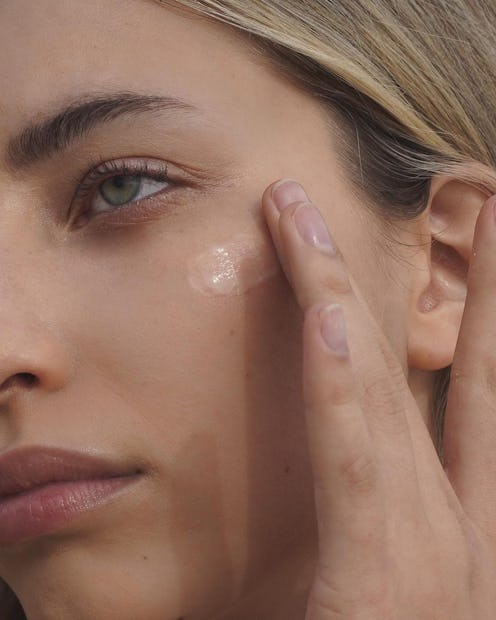(Skin)
Using These 2 Skin Care Ingredients Together Can Give You Your Healthiest Skin Ever
No, seriously.

No one needs to explain the perks of vitamin C. It's as ubiquitous in skin care for treating hyperpigmentation, dullness, and environmental stress as it is in the supplement world, where it appears across grocery store shelves in the shape of orange-slice gummies. However, other popular skin care vitamins — such as B3, aka niacinamide — require a bit more digging. (Good luck spelling it right the first time, too.) Dig away, though, since the vitamin C and niacinamide duo has quickly become one of the most popular combinations of late, thanks to how both ingredients complement one another.
Read more: Can You Use Retinol & Vitamin C Together? Experts Explain
Read more: Multivitamins Vs. Individual Vitamins — Which Are Better For You?
"Vitamin C and niacinamide actually carry some similarities in terms of their benefits, but they each also have their own unique benefits," says Heather Wilson, InstaNatural's director of brand development and a licensed esthetician. "Separately, niacinamide excels at providing strength to the skin’s barrier and vitamin C is excellent for preventing and softening the look of fine lines and wrinkles." According to Wilson, both vitamin C and niacinamide play the role of protecting skin against the environmental aggressors you'll encounter throughout your day. So, double the protection, double the benefits.
Read more: 15 Retinol Facts That You Probably Didn’t Know
The Benefits Of Vitamin C
Vitamin C is commonly recommended as part of a daily skin care regimen, but what are its actual benefits? According to Dr. Margarita Lolis, a board-certified dermatologist at Schweiger Dermatology Group in Hackensack, New Jersey, vitamin C is a potent antioxidant that works to fight harmful toxins (also known as free radicals) such as unprotected sun exposure, pollution, poor diet, and smoking. “These are some of the factors that cause premature aging in our skin (think: wrinkles, loss of collagen leading to skin sagging, hyperpigmentation, etc.),” she tells TZR.
Dr. Lolis also points out that vitamin C is known to help skin look plumper and fight hyperpigmentation. “Topical vitamin C can help stimulate the production of collagen and elastin helping to keep the skin plump and firm,” she says. “It also helps to inhibit the skin’s production of melanin which is the cause of dark spots and hyperpigmentation. Over time, it can stop dark spots from forming in the first place.”
The Benefits Of Niacinamide
There’s a reason why you’re seeing niacinamide everywhere these days. The water-soluble vitamin (comprised of vitamin B3 and nicotinamide) is a powerful multitasker that addresses a slew of common skin concerns. “[Niacinamide] works with your skin to help minimize large pores, restore moisture loss and dehydration, and even out skin tone,” says Dr. Lolis. “While niacinamide is the most well-known product to combat enlarged pores, it is a powerhouse product that helps boost hydration and moisturizer’s ability to hold moisture in the skin. It works the best with moisturizers that contain glycerin and sodium hyaluronate.”
Benefits Of Using Vitamin C & Niacinamide Together
Why use both vitamin C and niacinamide, then? "They both have similar benefits while also 'filling the gaps' within the other," notes Wilson. She explains that using a combination, rather than just one or the other, "can amplify their similarities" in the natural glow and skin protection department, while also tapping into the individual perks.
"For the most part, niacinamide is known to support a strong and resilient skin barrier as well as helping to reduce the look of dryness, irritation, and dullness in the skin," says Wilson. "However — in the right formula — niacinamide has been also shown to help the look of blemishes and excess oil production." (One 2006 Journal of Cosmetic & Laser Therapy study saw that 2% niacinamide could be effective at wrangling in sebum, so keep an eye out for that percentage if that's the reason you try it out.)
“When combined, vitamin C and niacinamide work to fight existing discoloration and hyperpigmentation on the skin as well as prevent new discoloration from forming,” Dr. Lolis adds. “Vitamin C works by suppressing an enzyme known as tyrosinase, which is needed to produce pigment within the skin. Studies have shown that niacinamide may prevent the transfer of pigment within the cells, which can stop future pigmentation from forming.”
Cons To Using Vitamin C & Niacinamide Together
As is normal any time you begin combining hardworking skin care ingredients, you might encounter drawbacks depending on how your face reacts. "For some skin types, the combination could be too advanced. While niacinamide is generally good for those with sensitivity, too much or when combined with other advanced ingredients could cause irritation," says Wilson. Combat this by starting slow, then upping both ingredients when your skin has had time to adjust and "as your skin’s tolerance allows," she adds. "If you notice any dryness or irritation, decrease back to the frequency that was most comfortable to your skin."
How To Apply Vitamin C & Niacinamide
Skin comfort plays into how you should layer on your vitamin C and niacinamide, too. "Specific use is highly dependent on your skin care routine and goals," explains the esthetician. Wilson notes that either ingredient is safe for use morning or evening, and that "if you’re using a combination product [that includes both] or layering a serum with a moisturizer — you can apply them either way!"
And yes, there are more than a handful of facial products which feature both vitamin C and niacinamide, so you can get all those good skin benefits in one swoop.
Ahead, a few of TZR's favorite vitamin C and niacinamide products.
We only include products that have been independently selected by The Zoe Report's editorial team. However, we may receive a portion of sales if you purchase a product through a link in this article.
This article was originally published on